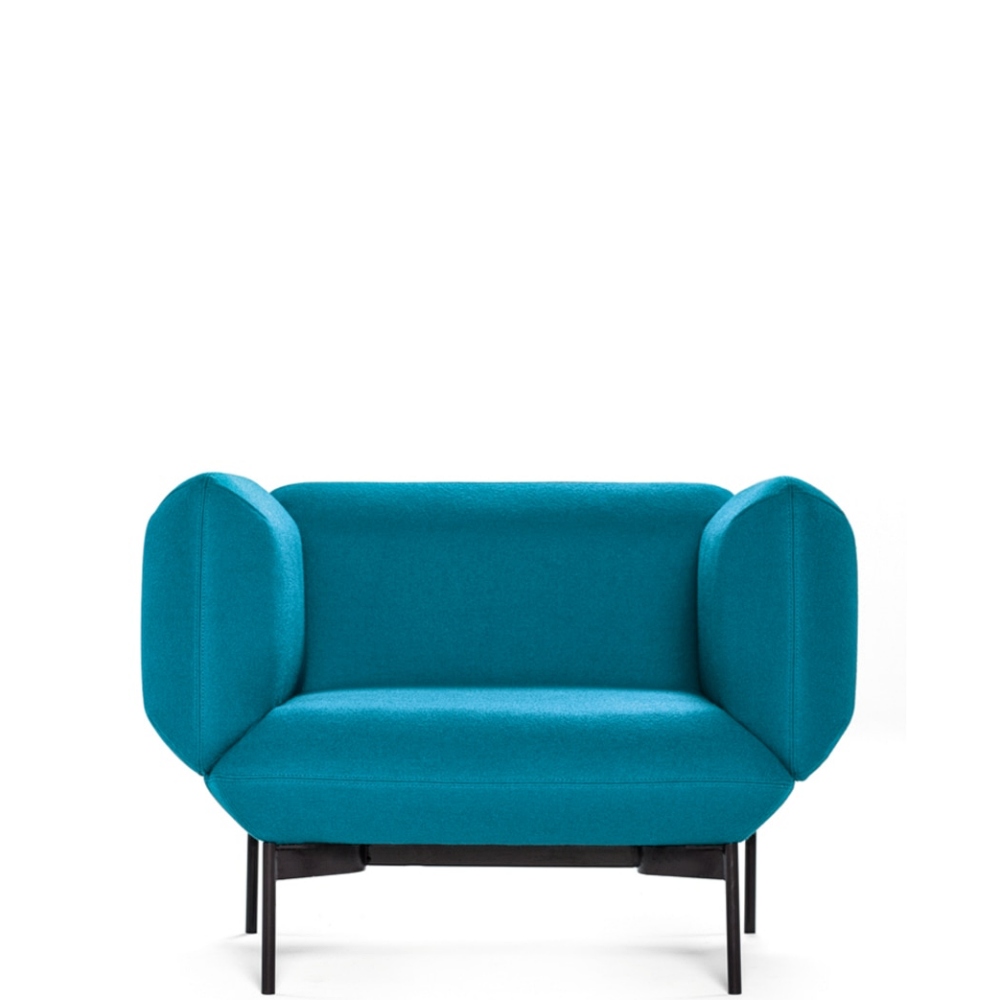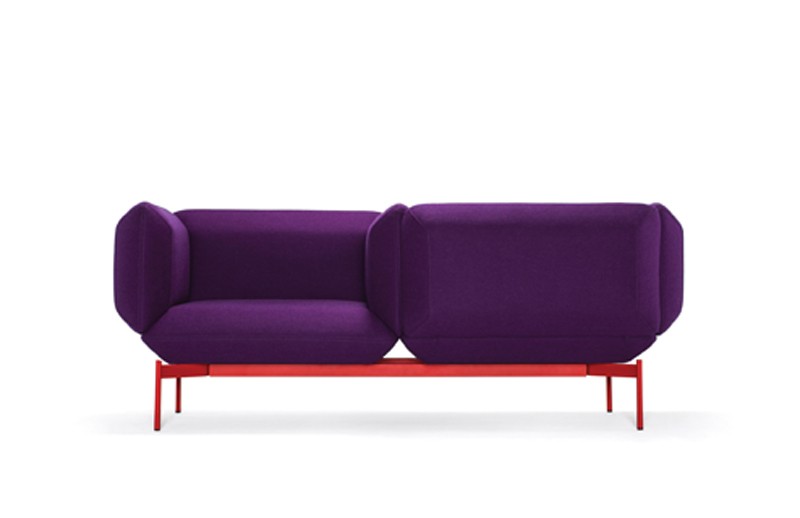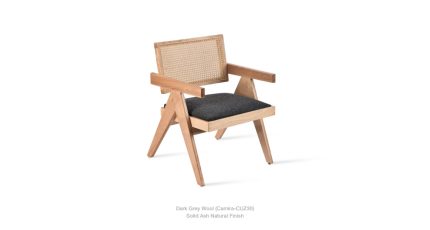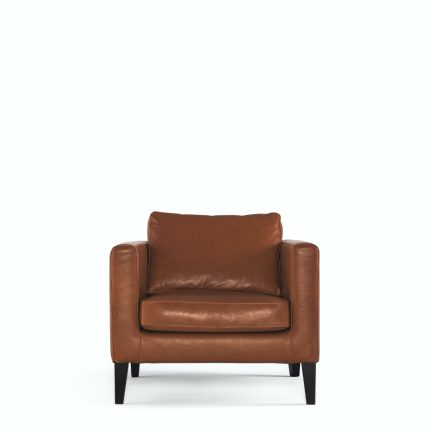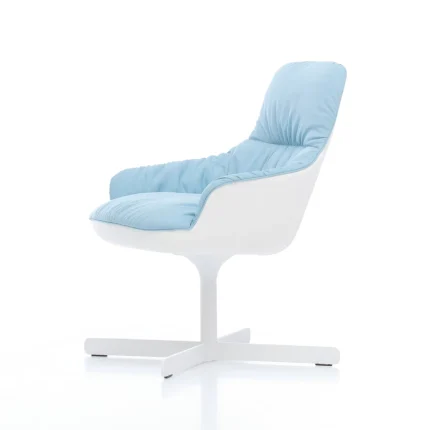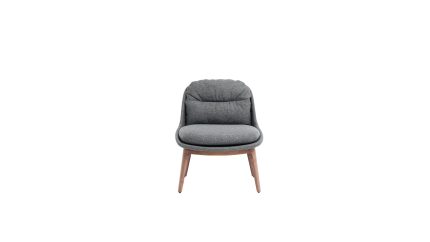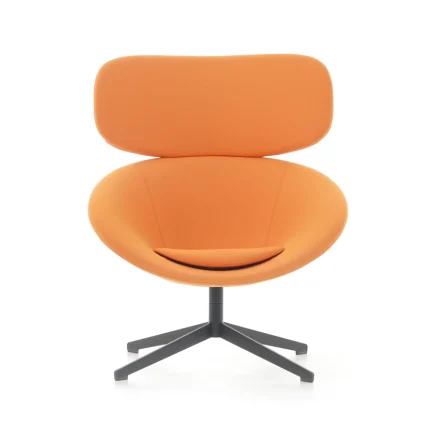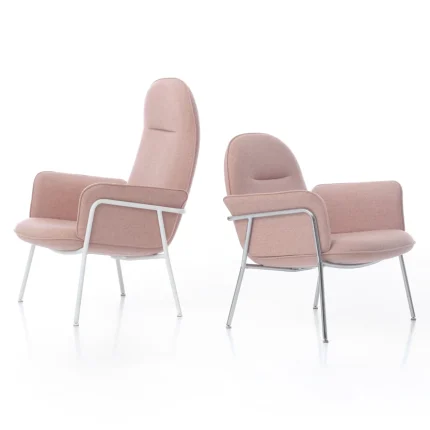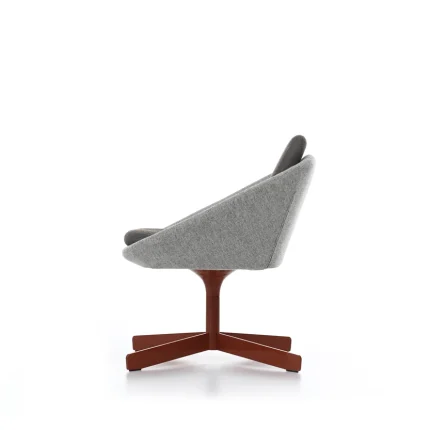Segment | © Numen / For Use
Segment is a system that solves the hierarchical principles of assembling the components of modular upholstered furniture. Segment's identity is determined by the form of its main component part, with its characteristic basic double-sided ends sloping at a 45° angle, thereby enabling the assembling of the parts in all three axes. Segment plays homage to the digits of early 7-segment digital watches, a concept that yields the possibility of putting together a variety of functional and even unconventional compositions in space. The countless combinations for, and permutations of the base owing to the open system that is the designing of various functional situations in the interior. Segment is available as a one-seater, two-seater, 3-seater, 4-seater, 5-seater – in short, a ‘multi-base’ series of segments. The combinations in a series of multiple bases will on one side be supported by metal feet, while a supporting wooden component with a high luster finish will extend from beneath the base on the other side of the system. Its form's geometric motif is as equally compatible with a leather cover, as with richly textured fabrics, according to the dictates of the interior.
Segment Data Sheet
Technical Info
| Structure | solid wood, plywood |
|---|---|
| Suspension | wave springs |
| Seat & backrest | HR foam, polyester wadding |
| Base | metal legs + powder coated matte / lacquered MDF platform |
| Upholstery | fabric / leather |
Dimensions
- Two Seater: 65"w | 35.5" d | 27h" | 15.8" seat height
- 2.5 Seater: 78.8"w | 35.5" d | 27h" | 15.8" seat height
- Three Seater: 78.8"w | 35.5" d | 27h" | 15.8" seat height
Please see the datasheet for more measurements details.
Numen / For Use
Numen/For Use is an internationally acclaimed design collective led by product designers Sven Jonke, Christoph Katzler, and Nikola Radeljković. For the past 20 years, the group has been active globally in the fields of industrial and spatial design, scenography, and conceptual art. Numen’s distinctive experimental vigor and an interdisciplinary approach are reflected in the variety of objects and spaces they design for Prostoria. Their visual language is consciously reduced and implicit, and their concepts are strongly based on form and formal expression, while grounded in respect for local modernist heritage and its wide societal impact. Their designs for Prostoria include Polygon, Oblique, and Trifidae easy chairs, Oblikant, Bik, Dobra, and Osmo chairs, and Revolve, Layout, Absent, Segment, Combine and Fade sofas.
Prostoria
We tend to perceive furniture as something abstract, created on designers’ desks and then produced, branded, and placed on the market by companies with different statuses and reputations. In fact, relations inside the contemporary globalized furniture industry are becoming more and more fragmented with less and less opportunity for complete dedication to synergies and collaborations… Prostoria, as a young company whose catalog already comprises some new icons such as the Polygon armchair and the Revolve transformable sofa, stands as an example of a different and more traditional approach based on the evolution from the local factuality and logical clustering of all actors involved in the production process.
Rapid development of Prostoria, formerly known as Kvadra, a company which has come a long way, from “starting from zero” to positioning itself as the leader and promoter of new ideas in only a few years time, is a story about the reintroduction of continuity both in Croatia and Central Europe, a region with vital but insufficiently recognized design scene and remarkable tradition and knowledge of the furniture industry. Those elements served as latent potentials that provided grounds for continuation and had to be activated.
Since the beginning, Prostoria has been developing an integrative approach, functioning as a collaboration platform that nourishes and stimulates a continuous exchange of knowledge and experience between all the actors participating in the production of furniture. A dynamic workshop ambiance has been created offering opportunities mainly to young designers to explore their ideas in excellent conditions and bring them to the highest level of design, functionality, and technological artisanship. Many products have been developed over long periods of time surpassing a number of iterations until reaching their final form, which would be impossible without adequate support combining contemporary technology and meticulous craftsmanship and handwork of the highest quality. Predominantly local materials are used, especially solid wood, and most of the production takes place within the company itself or in collaboration with local cooperatives.
While the company’s catalog also offers furniture based on tested models, Prostoria shows strategic and even passionate dedication to research-based design, convinced that authenticity has its place on the market but presents a special challenge in times when it seems almost impossible to create truly innovative and fresh concepts. For that reason, Prostoria’s social responsibility and specific position have to be observed as a contribution to the evolution of design and readiness to take risks in order to reach new values for the benefit of users and the culture. Thus, Prostoria stands as a project inside which designers grow together with the company on the grounds of mutual trust and shared goals.
[embedyt] https://www.youtube.com/watch?v=mru7rSC8-qw[/embedyt]
Final Tiles Gallery id=184 does not exist

